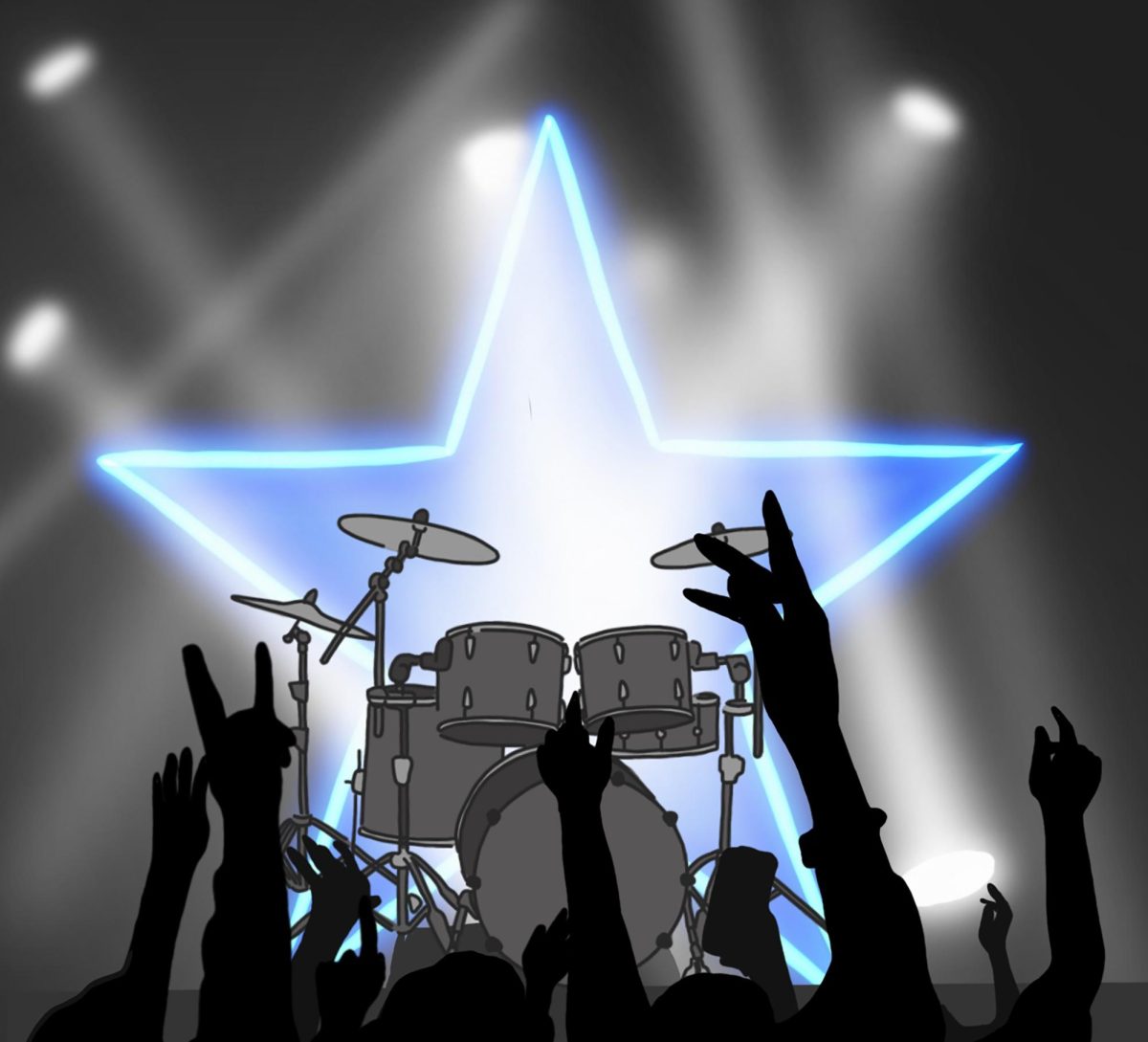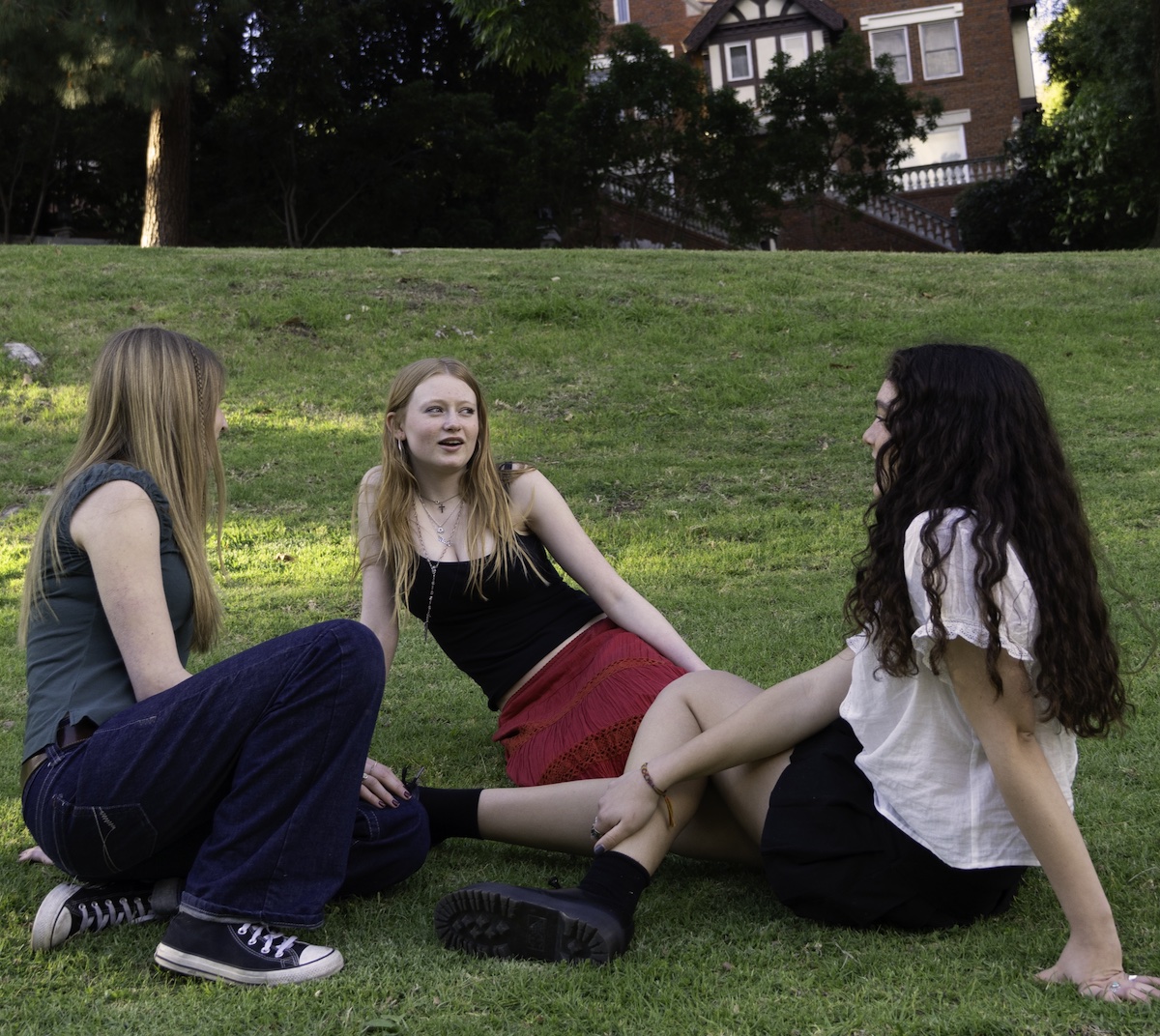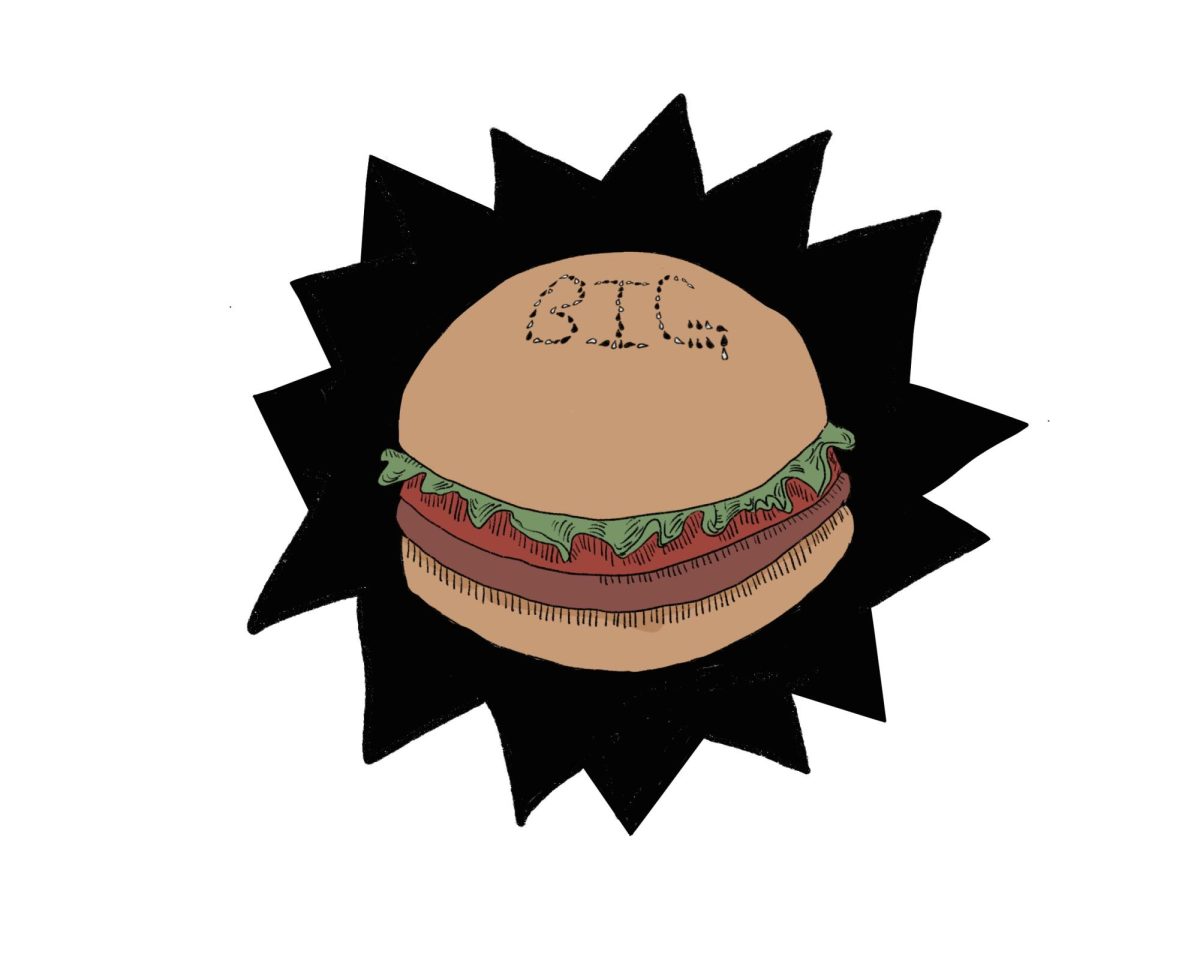Concerts have long been an integral part of youth culture around the world. With exciting celebrities, loud music and dazzling displays, it is no mystery why these events have captivated music fans for decades. However, many speculate that since the COVID-19 pandemic, the concert scene has undergone a noticeable change, as crowds have become increasingly boisterous.
There have been a multitude of videos posted online of fans snatching posters from one another in rage due to a blocked view. Additionally, concertgoers have been increasingly focused on videoing concerts from start to finish for views on social media, which has been identified as a possible cause for objects being thrown more often than in previous years. Some people hope that if they throw their phone onto the stage, the artist will use it to film a personalized video. John Drury, a professor of social psychology at the University of Sussex, believes the possibility of becoming “TikTok famous” by posting an exclusive video of a celebrity onstage, or even one filmed by a celebrity, has motivated many fans to be disruptive during performances.
At a Cardi B concert in July, a fan threw a drink at her in the middle of her performance of “Bodak Yellow,” according to CNN. In reaction to this, Cardi B threw her microphone into the crowd and yelled at the fan who targeted her.
Following the incident, a concertgoer filed a report with the Las Vegas Metropolitan Police Department (LVMPD) that detailed how they were hit by an item thrown from the stage at the concert location, though they never explicitly named Cardi B. LVMPD closed the case due to insufficient evidence, but the incident still stands as an example of the aggression that has been present in both the crowd and on the stage in recent years.
One relevant event occurred late this November at Taylor Swift’s Brazil leg of the Eras Tour. After the heat index in Rio de Janeiro reached 60 degrees Celsius (equivalent to 140 degrees Fahrenheit), 23-year-old Ana Clara Benevides tragically suffered two cardiac arrests and subsequently passed away. In reaction to Benevides’s death as well as numerous other instances of fainting due to the extreme heat, Swift decided to postpone the concert scheduled for the following night and was met with outrage. Numerous fans shared videos of the crowd booing Swift after the decision to postpone the show was released
Many fans criticized this response as ignorant and dismissive of the dangerous conditions created by the heat.
“Real Swifties would never boo [Taylor Swift] for trying to keep everyone safe,” a fan wrote in the comment section of a TikTok showing fans protesting.
These instances also have the capacity to injure the artists themselves. In a story by People magazine, the reporter describes how Bebe Rexha was hospitalized in July after a fan named Nicolas Malvagna, 27, threw his phone at the stage, knocking her to the ground in the process. Malvagna’s actions led to his arrest at the venue later that night, and he was eventually charged with assault after using his iPhone as a weapon and giving Rexha a black eye and a severe laceration, which required stitches.
Other artists have defended performers who have been seriously injured at these events. During her current residency at The Colosseum in Las Vegas, Adele called out those who engage in dangerous behavior at her concerts. An article by NBC’s “Today” show describes how she elaborated on the dangers of throwing objects on stage, and how she believes this trend reflects the general spirit of the public in America.
“Have you noticed how people are like forgetting … show etiquette in America?” Adele said during the concert. “They’re just throwing [stuff] on stage.”
The artists themselves are not the only ones speaking up against the disorderly behavior that has become increasingly present in concert venues across the nation, as other people have noticed a distinct shift in concert culture, as well.
“What I’m noticing is the alarming trend toward a lack of boundaries,” comedian Karith Foster said in an interview for Fox News. “I think we’ve been seeing a gradual decline of manners and polite behavior all around since coming back from the forced shutdowns caused by COVID.”
Many people in the Marlborough community have also noticed this shift in crowd behavior. Students and parents alike are concerned about the potential dangers one could face while trying to have a fun night out with friends listening to good music.
“I recently witnessed someone being carried out on a stretcher before the concert had even started,” Ashlyn Saltzburg ‘25 said. “This occurrence made me aware of how quickly concerts can escalate. As someone who enjoys watching live music, I felt disappointed observing these irresponsible choices and actions.”
Students face the crowds
Quite a few students shared their own stories of fan encounters at concerts. Of the positive stories shared, many referenced their experience at the Eras Tour over the summer.
“I feel that when I went to the Taylor Swift concert, it felt like a community,” Natalie Kim ‘29 said. “It just felt so happy and pure.”
Other students remarked on the deeply emotional experience of seeing an artist live and the lasting profound effect that concerts have.
“I remember a ton of people cried,” Chaplin Brown ‘29 said about the Eras Tour.
However, students have had more negative
experiences at concerts recently. In some instances, devotion to artists can go to an extreme level.
“I was at The Cure concert at the Hollywood Bowl and these two crazy girls were screaming super loud the whole time,” Sofia Klein ‘24 said.
Violence and other poor behavior have also been experienced by students.
“After somebody had passed out and the concert had stopped, these two girls pushed their way to the front and were like, ‘Why’d you stop playing?’” Anabel Adams ‘25 said. “When the guy tried to shut her up, she tried to punch him.”
Students have reported that violence and fights have especially increased at music festivals.
“When we were waiting for Travis Scott, this guy pushed through the crowd and had a bloody forehead because someone hit a bottle on his head,” Sasha Barnow ‘25 said.
Additionally, the interactions between concertgoers have become increasingly volatile.
“My friend Caroline got yelled at and cursed for trying to push through to get to us for Frank Ocean,” Barnow said.
Fans also aggressively fight for space at concerts, sometimes resorting to anger and aggression to get a better view of the show.
“When the gate opened, they let people run up to the stage,” Maya Napoli-Grover ‘25 said. “People stampeded and ignored security guards, were jumping on top of each other and pushing past people who had been there earlier than them.”
Others witnessed even more violent, personal interactions between fans and security guards.
“I saw a woman choke out a security guard after he wouldn’t let her into the pit,” Clara Fenske ‘24 said.
There seems to be a general feeling among some that there has been an increase in poor behavior between fans as a result of trying to find space at concerts.
“It’s kind of funny how rude people are at concerts, like people tend to be a lot more selfish,” Adams ‘25 said. “These full millennials were standing and they had all this room in front of them. My friends and I took that room, and then they started passive-aggressively talking about us to each other while we were standing right there.”
Other students also noticed the same trend.
“There’s just a lot of generally pretty outright aggression, which I think definitely, to some extent, took away from the unity of the concerts,” Napoli-Grover said.
Fans after isolation
A survey was sent to the Marlborough student body, and according to the 53 responses, 60% of students agreed with the statement that the general behavior of fans at concerts has changed.
This change can often be attributed to the pandemic. For instance, professionals have noted a change in concert behavior, attributing such a shift to “a world that has been deprived of physical live music gigs due to a pandemic that is now re-emerging (and consequently crowds being physically together again),” Dr. Lucy Bennet, a lecturer at Cardiff University with vast knowledge in fan culture, said in an article in Dazed magazine.
Concert behavior has been affected by the pandemic in multiple different ways. First, as previously mentioned, the increased use of social media as a result of the pandemic has led fans to try to become famous through content from concerts.
“Some believe that the rise in incidents may be driven by social media, with fans trying to become a part of the show, in order to post videos of stunts that could potentially go viral,” Nadia Khomami wrote in an article in The Guardian.
Secondly, the pandemic has likely exacerbated the issue of poor social behavior. Increased devotion to artists during the pandemic led to greater excitement and interest in concerts and artists post-pandemic. When lockdown ended, people began to make the pilgrimage to concerts as a display of devotion and participate in extreme fan behavior, such as crying or constant yelling to
demonstrate their enthusiasm.
“Lots of people use artists or music as a means of being an identifier and feeling a deep connection to an artist or the meanings of their songs,” Ruby Fox ‘26 said. “The pandemic gave more time for people to dive into the world of music and get lost in it.”
However, this newfound devotion to artists has become more rampant and intense than simple admiration. People seem to think that they have a monopoly over artists and their music.
“There’s this hidden concert culture of people who are extremely obsessed with concerts and are willing to basically surrender their entire life and money to go to concerts,” Napoli-Grover said.
Not only did the pandemic foster devotion to artists, but it also led to a broader unlearning of basic social manners by the general population as the years spent inside led people to become out of practice in social interactions. This general lack of manners is apparent in concert settings, with fans becoming ruder and the sense of community between fans decreasing.
“People don’t know how to act and concert etiquette has been forgotten because of things like TikTok changing the music industry,” Barnow said.
However, it is important to remember that each concert experience is dependent on a variety of factors, such as fan base, venue, genre and more. While it is evident that concert culture is changing and adapting, it is impossible to make a single broad statement about change that encompasses every individual experience.
While the recent spike in immense adoration for artists might be disconcerting to many, it is important to consider the fact that it has been a trend for decades.
“In the past, we’ve had fans of The Beatles screaming, during punk, there was spitting, Tom Jones fans would regularly throw their underwear at him,” Bennett explained. “These are often communal forms of behavior that foster feelings of belonging in the fan community and allow people to perform and express their fan identity.”
Although the concert experience may have changed, some students believe the power of experiencing an artist live remains despite new behavior.
“We did meet people who were there to enjoy the concert just like us, and being able to be in a community of people who are enjoying the music is really special,” Napoli-Grover said.









